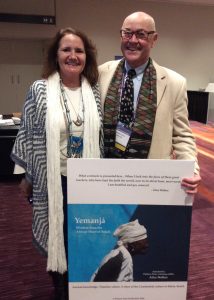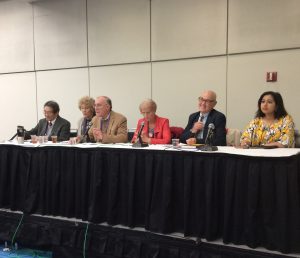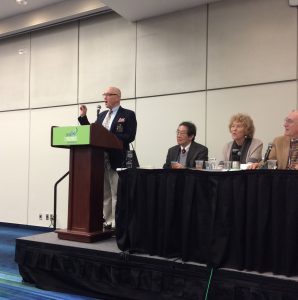On 4 November 2018, a keynote Earth Charter Panel took place at the Parliament of the World’s Religions with the purpose of exploring the significance of the Charter as a civil society document that represents inclusivity and interdependence and to look at how the vision of the Earth Charter is being realized in both theory and practice. The panel was convened by Mary Evelyn Tucker and John Grim, Co-directors of the Yale Forum on Religion and Ecology, and included rich reflections from panelists on how the Earth Charter contributes to a sense of a shared future. The panel was very well attended with several hundred participants.
Among the key ideas raised was that the Earth Charter remains a vibrant and useful document—a timeless gift to humankind. Its educational value remains undiminished. The Parliament provided a large and critically important audience for the Earth Charter. The setting of our responsibilities within the universe story continues to be profoundly compelling. The Earth Charter was, and still is, ahead of its time.
Peter Corcoran, one of the panelists, closed his remarks by saying, “Finally, one of the many sources of hope is, I think, particularly appropriate to the Parliament of the World’s Religions’ aspiration for unity and this panel’s aim to contribute to a sense of a shared future. This is the Earth Charter as a vision of our highest ideals. We may not realize our ideals of democracy, non-violence, and peace; of social and economic justice; of ecological integrity; and of respect and care for the community of life; but they are like the stars, and currents, and landmarks by which we can navigate our journey. We need such a vision. Steven C. Rockefeller, Chair of the Earth Charter Drafting Committee, has written, ‘The Earth Charter sets forth a world affirming spirituality rooted in reverence for the mystery of being and reverence for life that finds meaning and joy in caring relationships with all that is.’ This reverence, these caring relationships are our hope.”
The programme was as follows:
Chair and Facilitator:
John Grim, Co-Director, Yale Forum on Religion and Ecology
John Grim is a Senior Lecturer teaching in the joint MA program in religion and ecology at Yale University School of Forestry and Environmental Studies and Yale Divinity School. Together with Mary Evelyn Tucker, he co-directed in the 1990s a ten-conference series and book project at Harvard University on “World Religions and Ecology.”
Panelists:
Mary Evelyn Tucker, Yale Forum on Religion and Ecology
Topic: The Earth Charter and the World’s Religions
Mary Evelyn Tucker is co-director of the Forum on Religion and Ecology at Yale where she teaches in an MA program between the School of Forestry & Environmental Studies and the Divinity School.
Tu Weiming, Director, Institute for Advanced Humanistic Studies, Beijing University
Topic: Spiritual Humanism and the Earth Charter
Tu Weiming is a preeminent Chinese scholar, a representative figure of contemporary Neo-Confucianism, and a crucial practitioner on the research and transmission of Confucian culture.
Heather Eaton, Professor, Conflict Studies, Saint Paul’s University, Ottawa
Topic: What Role Can the Earth Charter Play in Conflict Resolution
Heather Eaton received an interdisciplinary doctorate in theology, feminism and ecology at the University of Toronto.
Peter Blaze Corcoran, Research Fellow, Earth Charter Center for Education for Sustainable Development, University for Peace, San Jose, Costa Rica
Topic: The Earth Charter in Action: Education and Sustainability
Peter Blaze Corcoran is Professor Emeritus of Environmental Studies and Environmental Education at Florida Gulf Coast University. He is a leading scholar of the Earth Charter—editor of two books and dozens of journal articles in Earth Charter research. He has been a visiting professor in Australia, The Netherlands, Malaysia, Kenya, and Fiji.
Kekashan Basu, Youth Ambassador World Future Council
Topic: Youth Empowerment through the Lens of the Earth Charter
Winner of the 2016 International Children’s Peace Prize, 18-year-old Kehkashan Basu, has been impacting the global fraternity with her grass roots level work on environmental conservation through youth empowerment. She is the Founder President of Green Hope Foundation, which engages and empowers thousands of youth, especially girls.
In addition, in a Panel on Religious Pluralism, Dr. Mark Hathaway made a presentation on the Earth Charter in which he related it to some fairly universal religious values.
Click here for more information on the Conference.









